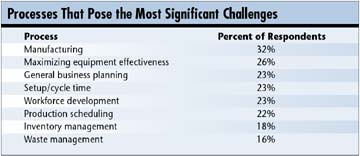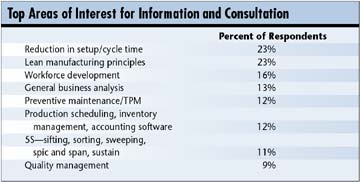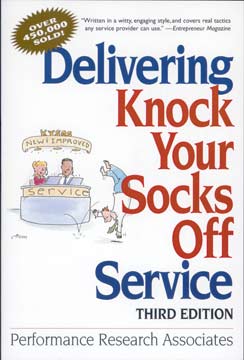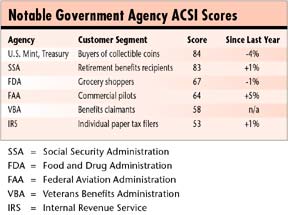Survey Says Small Job Shops Need Lean Help
A recent survey conducted by
the Society of Manufacturing Engineers reports that small
job shop owners and their employees need help with learning
more about lean manufacturing and workforce development
principles, general business analysis and how to reduce
setup cycle time.
A Reporting of the Lean Manufacturing Needs Assessment
of Northeast Manufacturers was compiled late last year from
attendees of the EASTEC Advanced
Productivity Exposition and identified the specific lean
manufacturing needs and production challenges of Northeast
manufacturers.
Among other information, the survey reported:
 Thirty-four percent of manufacturers recognize the need
for a lean approach or would like to implement lean principles
but aren't sure how to proceed.
Thirty-four percent of manufacturers recognize the need
for a lean approach or would like to implement lean principles
but aren't sure how to proceed.
 Forty-one percent of respondents are not familiar or slightly
familiar with lean principles but haven't considered implementing
them.
Forty-one percent of respondents are not familiar or slightly
familiar with lean principles but haven't considered implementing
them.
 Respondents from companies with fewer than 50 employees
are less likely to be familiar with lean and are less likely
to have implemented it.
Respondents from companies with fewer than 50 employees
are less likely to be familiar with lean and are less likely
to have implemented it.
 Midsized companies or OEMs are likely to be more familiar
with lean principles and have systems in place.
Midsized companies or OEMs are likely to be more familiar
with lean principles and have systems in place.
 Job shop owners and corporate executives are less familiar
with lean concepts than manufacturing engineers or quality
managers.
Job shop owners and corporate executives are less familiar
with lean concepts than manufacturing engineers or quality
managers.
"It was alarming how few manufacturers even knew
what lean was," comments Dan Radomski, show manager
for SME's EASTEC 2003. "But along with alarming numbers
comes an opportunity for learning."
As a result of the survey, SME developed a Lean Manufacturing
Pavilion and Conference at EASTEC 2003, scheduled for May
20-22 in West Springfield, Massachusetts. The pavilion will
provide a forum for attendees to meet with lean consultants
and equipment providers. The conference will offer workshops
and present case studies on lean principles.
"One of the many issues we'll address is the breakdown
of communication between those who know about lean and those
who allocate the funds within their companies," adds
Radomski. "Not only will the show focus on lean manufacturing
through products and services, but there will also be discussions
on why lean isn't implemented so there can be a better connection
between people who understand lean with those who are in
charge of the money or operations."
To learn more about the survey or EASTEC 2003, visit www.sme.org.


 Gallo
Toasts to ISO 9001:2000 Registration Gallo
Toasts to ISO 9001:2000 Registration
The E. & J. Gallo Winery
has achieved registration to ISO 9001:2000. It's the first
winery to become compliant to ISO 9001:2000, according to
BSI Inc., which granted the company registration.
Gallo's Brandy facility, Fresno Winery, Livingston Winery
and Gallo Glass Co., all located in California, obtained
registration.
"The ISO certification process allowed E. & J.
Gallo Winery to establish a robust quality system that is
standardized throughout our facilities and easy for our
employees to use," notes Doug Rinfret, corporate quality
management representative. "We anticipate improvements
in product quality, and we expect this will increase customer
satisfaction."
Rinfret added that the registration of these four facilities
is the first step in the company's initiative to have the
entire Gallo business registered. "Our corporate facility;
Modesto, California, bottling facility; and Sonoma Winery
will be working toward registration in 2003."
Medical Device Professionals Invited to
Upcoming Event
The Medical Design and Manufacturing
West Conference and Exposition is slated for Feb. 18-21
in Anaheim, California. The event is an information exchange
and networking forum for medical device designers and quality
systems professionals.
Program highlights include expanded FDA participation
featuring a full day of basic issues and a full day dedicated
to advanced regulatory issues, new training workshops by
leading instructors, a two-day track featuring new developments
in biomaterials and tissue engineering, and about 3,000
exhibitors. To learn more, visit www.mdmwest.com.
Correction
In the January issue of Quality
Digest, the name of the new Secretary-General of the International
Organization for Standardization was incorrectly printed
as Alan Dryden. The correct name is Alan Bryden. Quality
Digest regrets the error.
U.S., Canada Cooperate on ISO 9000 and
ISO 14000 Accreditation
The first meeting of the SCC-ANSI-RAB
Harmonization Committee was recently held to establish collaboration
between the Standards Council of Canada and the
American National Standards Institute's Registrar Accreditation
Board. Under the committee's Mutual Recognition Agreement,
both organizations have agreed that ISO 9001 and ISO 14001
registration certificates issued by their accredited certification/registration
bodies are equivalent.
Both organizations base their decisions to accredit certification/registration
bodies on the same criteria. The committee will focus on
accreditation body program operations, consistency in the
application of accreditation requirements and harmonization
of accreditation body procedures.
The SCC and ANSI-RAB National Accreditation Program are
developing joint processes and procedures for sharing information
and joint audit activity.
"Establishing joint procedures and processes leverages
the strengths of both organizations and ensures a uniform
level of competence," explains Pat Paladino, director
of conformity assessment for the SCC. "This leads to
the recognition of each other's audit results, thereby decreasing
duplication of activities."
The Harmonization Committee includes representatives from
the SCC, the ANSI-RAB, the International Association of
Accredited Registrars, the Canadian Conformity Assessment
Conference, and SCC and ANSI-RAB accreditation auditors.
To learn more, visit www.ansi.org,
www.rabnet.com or www.scc.ca.
Free E-Learning Course Provides the Basics
for Standardization
"Why Standards Matter,"
a free e-learning course that introduces the basics of the
voluntary standardization process, is available from the
American National Standards Institute, a nonprofit organization
that administers and coordinates the U.S. voluntary standardization
system.
The course is part of ANSI's instructor-led and Web-based
education and training program to teach users how to participate
in regional, national and international voluntary standards.
It's targeted to those who are not familiar with ANSI, including
higher education faculty and students, engineers, technologists,
and government and corporate management. It's also recommended
for ANSI members as an orientation for new employees or
new committee members.
A second course, "National and International Standards
Development," is planned this year.
ANSI is the official U.S. representative of the International
Accreditation Forum, the International Organization for
Standardization and the International Electrotechnical Commission.
To learn more, visit www.standardslearn.org.
 How
to Make Your Web Site Customer-Friendly How
to Make Your Web Site Customer-Friendly
If you've ever used the Internet to purchase something,
you've probably encountered the frustration of wading through
a company's Web site, trying in vain to find the information
you need. The difference between a well-organized site and
a confusing one is considerable:
Customer-friendly sites get more business, and customer-unfriendly
sites get forgotten.
Ron Zemke, author of Knock Your Socks Off Service (AMACOM,
2002), says the following criteria are musts for any organization
interested in starting or improving online customer service:
 Easy customer access to phone numbers. Too many consumer
Web sites don't list a phone number, or the number is too
small or difficult to locate. Every customer-driven company
should post a toll-free number clearly on its home page.
Easy customer access to phone numbers. Too many consumer
Web sites don't list a phone number, or the number is too
small or difficult to locate. Every customer-driven company
should post a toll-free number clearly on its home page.
 One-click help. Customers shouldn't have to click more than
once to find information on product availability, billing,
order confirmation, delivery tracking or other important
details. If customers can easily find what they need online,
they're less likely to call for help.
One-click help. Customers shouldn't have to click more than
once to find information on product availability, billing,
order confirmation, delivery tracking or other important
details. If customers can easily find what they need online,
they're less likely to call for help.
 A list of frequently asked questions. FAQs take the pressure
off live phone or online support by giving customers access
to the most commonly asked questions about the company and
its products or services. Some experts advise creating two
layers of FAQs--one for prospective or new customers with
fundamental questions and another for continuing customers.
A list of frequently asked questions. FAQs take the pressure
off live phone or online support by giving customers access
to the most commonly asked questions about the company and
its products or services. Some experts advise creating two
layers of FAQs--one for prospective or new customers with
fundamental questions and another for continuing customers.
 Standards for e-mail response. Long delays in response time
can dull customer loyalty. Set standards for response time
to e-mail inquiries--ideally within the same day--and clear
guidelines for answering questions and addressing problems
in customer-sensitive ways.
Standards for e-mail response. Long delays in response time
can dull customer loyalty. Set standards for response time
to e-mail inquiries--ideally within the same day--and clear
guidelines for answering questions and addressing problems
in customer-sensitive ways.
 Product return channels that complement each other. When
customers order a product online, they want the same refund,
return and exchange guarantees as they would at the company
store. A company's Internet return policies should mirror
in-person product return.
Product return channels that complement each other. When
customers order a product online, they want the same refund,
return and exchange guarantees as they would at the company
store. A company's Internet return policies should mirror
in-person product return.
E-Filing Makes Individuals Happier With
the Internal Revenue Service
The latest American Customer
Satisfaction Index indicates that Americans who file their
taxes electronically are more pleased with the Internal
Revenue Service than those who file by mail. The ACSI's
fourth-quarter 2002 results, which contain scores for government
agencies, show a score of 78 (of a possible 100) among those
who filed their taxes electronically, compared with a mark
of 53 for individual paper tax filers.
"Tax filers view electronic filing as simple and
efficient," says Claes Fornell, professor of business
and director of the University of Michigan Business School's
National Quality Research Center, which compiles and analyzes
the ACSI data. "Although the overall score for individual
tax filers is substantially low at 62, it still represents
a 22-percent improvement since 1999."
No organization, public or private, has shown similar
improvement in the same period of time, according to Fornell.
The average ACSI score for all government agencies, including
those that are regulatory and those that administer benefits,
fell to 70.2 from the previous year's record high of 71.3.
Large declines in satisfaction occurred within Medicare
and divisions of the IRS, which account for most of the
drop in the overall score.
The Centers for Medicare and Medicaid Services received
a score of 76, down four points from the previous year.
The score for the IRS among its small business corporate
users is down 9 percent to 60. Midsized and large businesses
gave the IRS a score of 52, a six-point drop.
The U.S. Mint registered the highest score among all agencies.
Its mark of 84 was followed by the Social Security Administration's
score of 83 for retirement benefits recipients.
ACSI is produced through a partnership among the University
of Michigan Business School, the American Society for
Quality and the CFI Group. For a look at all ACSI scores,
visit www.theacsi.org.

|